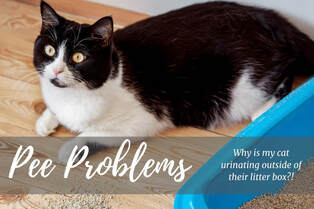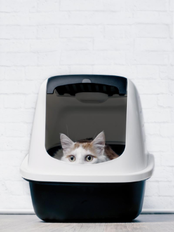|
As cat owners, we have all smelled THAT smell. The smell of cat urine, pungent and unpleasant to say the least. Usually, the smell just means its time to scoop the litter box, but what if it’s coming from outside of the box?  Life would be so much easier if our cats could just explain to us, “Hey, human! I don’t like the way this new kitty litter feels under my paws, so from now on I will be using your clean laundry as a toilet,” or “Something is wrong, and it hurts when I pee. I had an accident under the bed because that is where I felt most safe.” Unfortunately, technology has not advanced enough for us to have conversations with our pets, so it is up to us as cat parents to figure out what is going on. If your cat starts urinating outside of the litter box, it is essential to have a veterinarian rule out any kind of medical cause. Cats are very good at hiding pain and discomfort from us, and regular veterinary visits can help us keep track of any changes taking place. Typically, inappropriate urination paired with lethargy, excessive meowing or crying, excessive water consumption, and more frequent urination is a sign that the issue is medical. Medical conditions that can lead to outside of the box urination include:
Once medical issues are ruled out, it’s time to take the investigation further into the secret life of cat behavior. Cats can be triggered to pee outside of their litter box for even the slightest of reasons - sometimes so simple they can be easily overlooked. Here are the most common behavioral factors associated with urination outside of the litter box. Changes to the Box or the Surrounding Area The first place to start is by assessing any new changes that have occurred surrounding the box. Moving their box to a new location, changing brands or types of litter, purchasing a new litter box, and even forgetting to scoop daily are all common changes that might lead to inappropriate elimination. It is important to help your cat adjust to these changes by gradually making them happen. For example, if you wish to change the brand or type of litter you are using, slowly introduce the litter a cup at a time until all the old litter is phased out. If you want to redecorate and move the litter box, do so by slowly moving it towards the desired location to allow your cat time to adjust. Cats are also very particular about how close the box is to their food and water, so be sure to consider this factor when moving the litter box to a new spot. If you are in the market for a box upgrade, be sure to hang on to the old box for a while to ensure that your cat likes the new box and will use it.  The Stress Factor Another common reason cats inappropriately eliminate are stress factors. Did you move recently? Have you brought home a new pet or had a baby? Stressors like these can cause disruptions in your cat’s daily life and confuse them. Encourage them to return to the litter box with calming aids, lots of play and exercise, and moving soiled materials into the box. If you have brought home a new pet, be sure your cat has personal space around their box so they aren’t bothered when they try to use it. If the new pet is a kitten or a new cat, be sure they have and are using their own box. Age Old age and senility can also be a factor in inappropriate elimination. If your cat is older in age, they might find that the high sided pan is just too hard to get in and out of anymore, so try opting for a shallower pan. In old age, cats can also start to forget things, much like people do. If you have an older cat that seems confused about where the box is, try adding additional boxes around the house. Territory Your home is your cat’s kingdom, and if they feel the kingdom is under attack, they will do everything in their power to maintain their domain - including urinating all over it. Sometimes urination issues arise from the presence of animals outside of your home. For example, if you feed a feral stray on your porch and your cat battles with the stray through the glass door, it wouldn’t be uncommon for them to urinate near the door to make sure the stray knows exactly whose turf they are on. Discourage roaming cats from your yard by planting lavender or using a commercial repellent that mimics the smell of a predator if they are causing issues with your pet. If you feed strays, find more neutral ground to do so on. Now that you might have determined the cause of inappropriate elimination, it’s time to clean! Cleaning up cat urine is an important step in trying to deter repeated behavior. We recommend Anti-Icky Poo or Urine-Off brand commercial cat urine cleaners. If you are looking for a DIY recipe, you can try 16 oz. hydrogen peroxide mixed in a sprayer with one tablespoon of baking soda and 4-5 drops of Original Dawn dish soap. Liberally spray area and scrub. Allow the area to dry, vacuum up remaining baking soda, and repeat a minimum of 3 times. With a little time, patience, and investigative work, it is possible to help get your cat back on track with their potty habits. If issues persist, give us a call to schedule an appointment for a more in-depth look into what might be going on with your pet. Comments are closed.
|
Categories
All
Archives
November 2022
|
|
Plymouth Sun Sailor 2019 and 2020
Readers' Choice Best Veterinary Clinic |
Clinic Hours
Monday - 9:00 am - 6:00 pm Tuesday - 9:00 am - 6:00 pm Wednesday - 9:00 am - 6:00 pm Thursday - 9:00 am - 6:00 pm Friday - 9:00 am - 6:00 pm |
|
Site powered by Weebly. Managed by IDEXX Laboratories

 RSS Feed
RSS Feed



